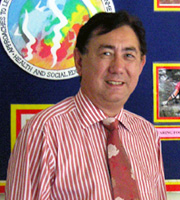|
Preparing our young for the world
of tomorrow
The way we now do things, behave and work is changing dramatically.
Globalisation, technology and changing societal expectations force
us to rethink how schools operate and
what type of education is necessary for a future world. Change is
inevitable, for without change there can be no improvement in the
quality of the education offered. Schools that do not
change are doomed to become irrelevant.
A child entering kindergarten today
will face a very different world when he or she enters the workforce
in 2026. An education now must be flexible enough to take account of
those changes. As we want our children to grow into active and
responsible citizens, respecting themselves and each other and being
able to balance their working lives and
leisure pursuits, they must adopt new and more creative learning
strategies to prepare them for the world of tomorrow. Planning for
change is therefore imperative.
Continuing the ACS tradition, we
educate our students to be open-minded, inquiring, socially at ease,
tolerant, resilient and confident. The emphasis is placed on those
teaching and
learning strategies that encourage our students to think critically,
creatively and independently. Working with others co-operatively and
with a strong focus and sense of purpose also allow students to
develop skills that can enhance their future lives.
Teachers must be passionate about
learning
Learning is complex and covers knowledge, skills, insights, beliefs,
values, attitudes and habits. Learning is the key to meeting the
demands of change and for developing the
potential of every individual. New theories of learning have emerged
in the last decade to allow students to acquire higher levels of
motivation and engagement in their own learning. The result is that
students develop positive and creative attitudes to learning. Once
students become eager to learn and realize that learning is fun,
they are then able to push their learning boundaries outwards and
upwards to ultimately enhance their creativity.
An acclaimed international
approach to learning
How do we achieve our vision of a learning community? We use an
acclaimed international approach to learning that allows us to graft
onto it those special aspects of the Indonesian, Singaporean, and
international curricula that provide for measurable outcomes. Hence
an International Baccalaureate framework supports a basically
Singaporean curriculum in the primary grades, IGCSE for grades 9 and
10, and international A levels or IB Diploma for grades 11 and 12.
Our students enjoy individual
attention
To provide a more personalized tutoring our classes are small. Hence
the programs of instruction
body can be tailored to suit an individualís needs and learning
style. Leadership activities are available
to all children in the primary and secondary schools as are the
co-curricular and extracurricular
activities. Over 15 nationalities are represented in the student
body and we actively celebrate and acknowledge intercultural
differences.
Faculty and standards
Our faculty comprises highly qualified, skilled and experienced
educators, with many of them having overseas educational
qualifications from the United Kingdom, Singapore, Canada,
Australia, New Zealand and the United States of America. To maintain
the highest quality of our academic standards in key learning areas
we benchmark them against global standards.
 Our membership of the ACS family of
schools enriches our approach to curriculum and assessment
and allows us to measure our progress against exacting and respected
standards. Our membership of the ACS family of
schools enriches our approach to curriculum and assessment
and allows us to measure our progress against exacting and respected
standards.
Mr Daryl Forde
Executive Principal
|